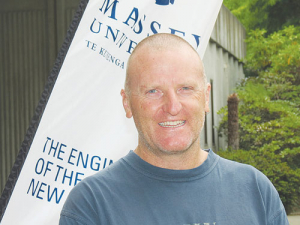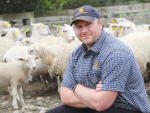Getting out of the classroom cranks the handles of many Massey University agriculture students.
They run small farms, weighing ewes and lambs and checking pasture intakes and pasture residues.
There are three groups of five each, made up of agriculture students and some studying commerce and animal science. All are third and final year bachelor course students.
A lecturer in the School of Agriculture and Environment, Danny Donaghy (DairyNZ professor of dairy production systems in the School of Agriculture and Environment), runs the farmlets.
Donaghy says the aim is to give students an idea of managing pregnant ewes through winter. He is helped by technician and manager Mark Osborne and head shepherd Brian Smith.
The farmlets started with 16 in-lamb ewes each in early May and the study ended late September.
All three groups were winners, says Donaghy, but one did better with lamb weights and the number of lambs and ewes.
“It is a safe place to try to manage new things,” said student Jack Arthurs-Schoppe. He and Graham Johnson, in the same group, say it is interesting learning outside the classroom.
“It is good and interesting this practical learning. You can see how your application yields results,” Johnson told Rural News.
Some of the group of 15 are keen to try farming, some want to be shepherds, one was keen on agronomy and others wanted to be rural professionals such as bankers and farm advisers.
Each group had an eight paddock farmlet of equal area and they started with the same number of ewes. Each group had a different rotation and set stocking strategy.
Two groups lost two ewes before lambing to bearings and a cast ewe which died within hours.
Johnston and Arthurs-Schoppe say they went out to check ewes once a day and farm staff went around lambing ewes three times a day. But the cast ewe was on her back and died between the groups’ checking.
This made a difference to lamb numbers: 23 was their final number and the other groups had 25 and 26.
“They got in-lamb ewes and had to run them from May to September. Those winter months are always difficult,” Donaghy explained.
“We start with lectures indoors and then they have to put all they have learned into practice on the farmlets. And they can only use grass-based systems. They are allowed to put on nitrogen fertiliser but that’s all -- no supplement.”
Learning on the job
Lamb weights varied from 13.8 to 14.5 kilograms and lamb numbers went from 23 to 26 per small farm.
Ewe weights varied at the start from 60 to 72 kilograms and two groups put on 30 kilograms of nitrogen in an effort to boost growth. Each group was asked what they would do differently. Most would change the rotation and when they set stocked ewes prior to lambing; others doubted the need for urea.
Prof Donaghy says each of the students will give a report on their farmlet and there is to be an oral interview as part of the process.
“They will also be asked about their pasture predictions in May versus the reality through winter. And what if they were in different regions, for example Northland or Southland, how would they expect the pasture to growth then? And what if they had to take ewes and lambs through to weaning? All these things we ask students to think about.”











